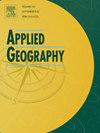Exploring socio-spatial differentiation in bike-sharing: A daily activity space analysis of cyclists across different socioeconomic statuses
IF 4
2区 地球科学
Q1 GEOGRAPHY
引用次数: 0
Abstract
Existing studies underscore the significance of traditional public transportation systems (e.g., buses and metros) in shaping residents' daily mobility patterns and social interactions. However, limited research has examined the spatiotemporal interaction patterns among users of dockless bike-sharing (DBS), an emerging low-carbon mode of public transportation. To address this gap, we investigate the daily spatiotemporal interaction patterns and disparities among bike-sharing users across different socioeconomic statuses (SES) in Shenzhen, China. Leveraging massive DBS trip datasets with user IDs, we delineate the individual daily activity spaces of frequent users across different SES groups. Taking into account spatiotemporal proximity and distance decay effects, we compute multiple activity-space-based differentiation indices, followed by comprehensive analyses. The results reveal that middle-SES users experience the greatest diversity in interactions with users from different socioeconomic backgrounds during daily cycling activities, followed by high-SES users, while low-SES users exhibit the least interaction. Furthermore, the activity-space-based differentiation for each SES group follows a consistent periodic temporal pattern, characterized by two alternating peaks and troughs throughout the day. Peaks emerge in midday and late-night hours, whereas troughs align with the morning and evening commuting periods. The degree of activity-space-based differentiation is strongly associated with proximity to central city and land-use functions. These findings provide valuable implications for promoting social integration and promoting equity in non-motorized and sustainable transportation services.
共享单车的社会空间分异:不同社会经济地位骑行者的日常活动空间分析
现有的研究强调了传统的公共交通系统(如公共汽车和地铁)在塑造居民的日常流动模式和社会互动方面的重要性。然而,对于一种新兴的低碳公共交通模式——无桩共享单车(DBS)用户之间的时空互动模式,研究有限。为了解决这一差距,我们研究了中国深圳不同社会经济地位(SES)共享单车用户的日常时空互动模式和差异。利用带有用户id的大规模DBS旅行数据集,我们描绘了不同SES群体中频繁用户的个人日常活动空间。考虑到时空接近和距离衰减效应,我们计算了多个基于活动空间的分异指数,并进行了综合分析。结果表明,在日常骑行活动中,中等经济地位用户与不同社会经济背景用户的互动多样性最大,其次是高经济地位用户,而低经济地位用户的互动最少。此外,每个SES组基于活动空间的分化遵循一致的周期性时间模式,其特征是全天两个交替的高峰和低谷。高峰出现在中午和深夜,而低谷出现在早上和晚上的通勤时间。活动空间分异程度与靠近中心城市和土地利用功能密切相关。这些发现对促进社会一体化和促进非机动和可持续运输服务的公平性具有重要意义。
本文章由计算机程序翻译,如有差异,请以英文原文为准。
求助全文
约1分钟内获得全文
求助全文
来源期刊

Applied Geography
GEOGRAPHY-
CiteScore
8.00
自引率
2.00%
发文量
134
期刊介绍:
Applied Geography is a journal devoted to the publication of research which utilizes geographic approaches (human, physical, nature-society and GIScience) to resolve human problems that have a spatial dimension. These problems may be related to the assessment, management and allocation of the world physical and/or human resources. The underlying rationale of the journal is that only through a clear understanding of the relevant societal, physical, and coupled natural-humans systems can we resolve such problems. Papers are invited on any theme involving the application of geographical theory and methodology in the resolution of human problems.
 求助内容:
求助内容: 应助结果提醒方式:
应助结果提醒方式:


